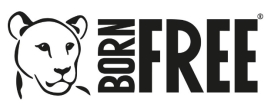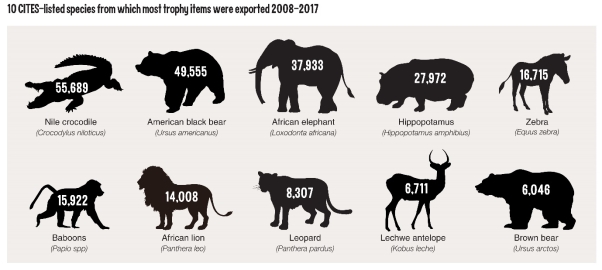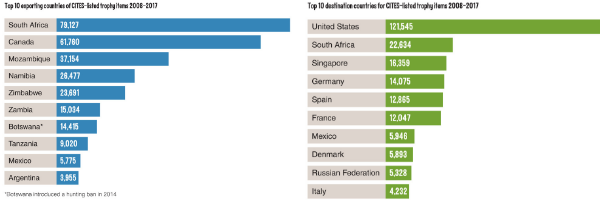
Canada ranked 2nd in top 10 worst countries for trophy hunting exports
International wildlife charity Born Free has revealed that Canada is ranked 2nd in the top ten worst offending countries in the world when it comes to exporting or re-exporting hunting trophies derived from internationally protected species.
According to official figures submitted by governments, in the decade from 2008 to 2017, a total of almost 290,000 trophy items derived from close to 300 different animal species listed on the CITES Appendices were exported or re-exported from 119 countries to 165 importing countries.1
The most numerous exported trophy items worldwide were derived from Nile crocodiles, American black bears, African elephants and hippopotamuses, with Canada exporting a shocking 61,760 trophies including 48,999 derived from American black bears and 1,168 from brown bears to name but a few.

South Africa, Mozambique, Namibia, Zimbabwe, Zambia, Botswana, Tanzania, Mexico and Argentina all made it into the top ten worst offending countries for exports. It was the United States though which was the declared destination for approximately 42% of all exports, with European Union Member States accounting for a further 27% and Singapore, Mexico and Russia in the top ten destinations list too.

Even more concerningly, these export figures are limited to CITES-listed species since they are regulated by a system of permits, and reported annually by governments to a central database which is made available to the public. Recreational hunting encompasses a much larger range of activities involving huge numbers of animals belonging to a wide range of species.
In fact, research by the Humane Society of the United States revealed that trophy hunters imported a total of more than 1.26 million wildlife trophies into the United States in the decade to 2014, almost two thirds of which were derived from Canada and South Africa2.
Dr Mark Jones, Head of Policy at Born Free, who led the research, commented:
“Trophy hunting is a cruel and damaging relic of a colonial era that causes immense animal suffering and disrupts wildlife social groups and populations, while doing virtually nothing to help wildlife conservation or local communities who live alongside wild animals. These statistics go to show how extensive trophy hunting continues to be, in terms of both the range of species and the sheer numbers of animals involved. It is shameful that countries continue to permit trophy hunting and allow the heads, skins, or other body parts of threatened animals to be shipped overseas so the hunters can display them on their walls or in their cabinets. This archaic activity must be brought to an end.”
For more information about trophy hunting and how to help visit www.bornfree.org.uk
1 CITES trade statistics derived from the CITES Trade Database, UNEP World Conservation Monitoring Centre, Cambridge, UK. Search conducted in March 2019 for exports associated with Purpose Code ‘H’ (Hunting Trophy), excluding items declared by weight or volume
2 HSUS and HSI. 2016. Trophy Hunting by the Numbers - the United States’ role in global trophy hunting. http://www.hsi.org/assets/pdfs/report_trophy_hunting_by_the.pdf
About Us
About Born Free
Born Free was founded by Bill Travers and Virginia McKenna, who starred in the movie classic, Born Free (1966), together with their eldest son, Will. Born Free’s mission is to ensure that all wild animals, whether living in captivity or in the wild, are treated with compassion and respect and are able to live their lives according to their needs. Born Free opposes the exploitation of wild animals in captivity and campaigns to keep wildlife in the wild.
Born Free promotes Compassionate Conservation which strives to enhance the survival of threatened species in the wild and protect natural habitats while respecting the needs of and safeguarding the welfare of individual animals. Born Free seeks to have a positive impact on animals in the wild and protect their ecosystems in perpetuity, for their own intrinsic value and for the critical roles they play within the natural world. For more information about Born Free please visit: www.bornfree.org.uk
Contacts
Links